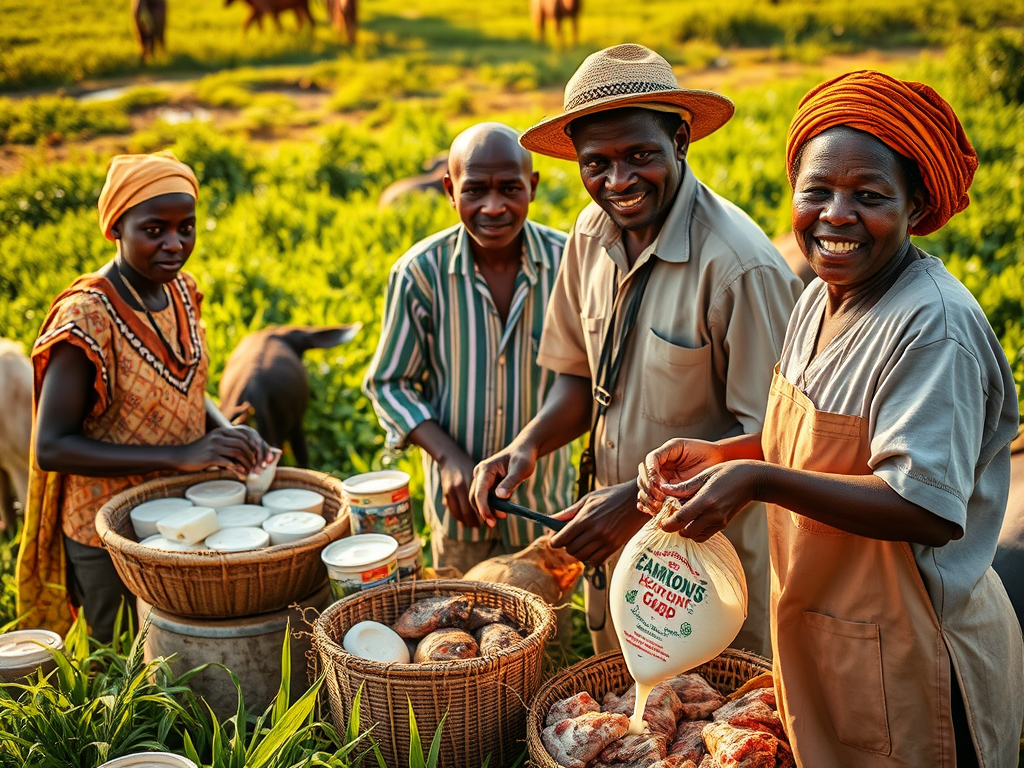Livestock farming is the lifeblood of Africa’s agricultural economy, supporting over 300 million people across the continent. In countries like Nigeria, Kenya, and Ethiopia, livestock contributes significantly to GDP, employment, and food security. Yet, many farmers remain trapped in cycles of low productivity and limited profitability. The key to breaking free lies in value addition and improved market access. By transforming raw livestock products into higher-value goods and connecting with lucrative markets, farmers can unlock unprecedented economic opportunities. This article explores how farmers in Nigeria, Kenya, and Ethiopia are already leading the way—and how others can follow suit.
The Challenge: Why Sticking to Raw Products Limits Profitability
Across Africa, many livestock farmers sell their products—milk, meat, eggs, and hides—in their raw form. While this approach requires minimal investment, it also caps their earning potential. For example, a liter of raw milk in Nigeria sells for about ₦200–₦300 (0.25–0.25–0.40), but when processed into yogurt or cheese, its value can triple or quadruple. Similarly, selling live cattle or raw hides often fetches far less than processed meat or leather.
The problem is compounded by poor market access. Many farmers rely on middlemen who offer low prices, or they sell only in local markets where demand is limited. To overcome these challenges, farmers must embrace value addition and explore new markets.
Unlocking Value Addition: Success Stories
Value addition is the process of transforming raw livestock products into higher-value goods. This not only increases profitability but also reduces post-harvest losses and creates jobs. Here are some inspiring examples from across Africa:
1. Dairy Processing in Kenya
Kenya is a leader in dairy farming in Africa, with the sector contributing about 4% of the country’s GDP. One success story is the Githunguri Dairy Farmers Cooperative Society, which processes raw milk into yogurt, cheese, and butter. By adding value, the cooperative has increased its members’ incomes and created jobs for over 1,000 people. Today, Githunguri’s products are sold in major supermarkets across Kenya, including Nakumatt and Tuskys.
2. Meat Processing in Ethiopia
Ethiopia has the largest livestock population in Africa, but many farmers struggle to profit from their animals. The Elfora Agro-Industries company is changing this by processing meat into sausages, canned products, and smoked meats. Elfora sources livestock from smallholder farmers, processes the meat, and sells it domestically and internationally. This model not only boosts farmers’ incomes but also meets the growing demand for processed meat in urban areas.
3. Leather Production in Nigeria
Nigeria’s leather industry is one of the most promising sectors for value addition. Companies like NILEST (Nigerian Institute of Leather and Science Technology) are training farmers and entrepreneurs to process hides and skins into high-quality leather. This leather is then used to produce shoes, bags, and other fashion items. In 2020, Nigeria’s leather exports were valued at over $600 million, showcasing the sector’s potential.
4. Egg Grading and Packaging in Kenya
In Kenya, the Kenya Women Finance Trust (KWFT) has supported women farmers to venture into egg grading and packaging. By sorting eggs by size, cleaning them, and packaging them attractively, these farmers have accessed high-end markets, including hotels and supermarkets. This simple value addition has doubled their profits.
5. Manure as Fertilizer in Ethiopia
Livestock waste is often seen as a nuisance, but in Ethiopia, it’s being turned into gold. The Ethiopian Soil Information System (EthioSIS) promotes the use of processed manure as organic fertilizer. Farmers who adopt this practice not only earn extra income but also improve soil fertility, boosting crop yields.
Improving Market Access: Strategies That Work
Access to reliable markets is critical for maximizing profits. Here are some proven strategies from Nigeria, Kenya, and Ethiopia:
1. Cooperatives and Farmer Groups
Cooperatives empower farmers to pool resources, negotiate better prices, and access larger markets. In Kenya, the Githunguri Dairy Cooperative has over 20,000 members and processes over 100,000 liters of milk daily. Similarly, in Nigeria, the Miyetti Allah Cattle Breeders Association is helping pastoralists access formal markets for their livestock.
2. Leveraging Technology
Mobile apps and online platforms are revolutionizing market access. In Kenya, the iCow app helps farmers track livestock health, find buyers, and access training. In Nigeria, platforms like Farmcrowdy connect farmers with investors and buyers, ensuring fair prices for their products.
3. Export Opportunities
Ethiopia is a shining example of how livestock products can tap into global markets. The country exports processed meat, leather, and dairy products to the Middle East, Europe, and Asia. In 2021, Ethiopia’s leather exports alone earned over $130 million.
4. Government and NGO Support
Governments and NGOs play a crucial role in improving market access. In Nigeria, the National Livestock Transformation Plan (NLTP) aims to modernize livestock farming and create market linkages. In Kenya, the Kenya Dairy Board regulates the sector and supports farmers in accessing markets.
The Economic Impact: Transforming Lives and Communities
The benefits of value addition and improved market access extend beyond individual farmers. They include:
- Increased Income: Farmers earn more by selling processed products at higher prices.
- Job Creation: Processing units create employment opportunities, especially for women and youth.
- Reduced Post-Harvest Losses: Proper storage and processing minimize waste.
- Food Security: High-quality, affordable products improve nutrition and food security.
For example, the Githunguri Dairy Cooperative in Kenya has lifted thousands of families out of poverty. In Nigeria, leather exports are creating jobs and boosting foreign exchange earnings. In Ethiopia, processed meat and dairy products are meeting the demands of a growing urban population.
Conclusion: A Bright Future for African Livestock Farming
The economics of livestock farming in Africa is transforming, thanks to value addition and improved market access. Farmers in Nigeria, Kenya, and Ethiopia are already reaping the benefits, and others can follow suit by adopting similar strategies. Governments, private sector players, and development organizations must continue to support these efforts through training, funding, and infrastructure development.
By embracing innovation and collaboration, African livestock farmers can unlock the full potential of their businesses, contributing to the continent’s economic growth and food security.


